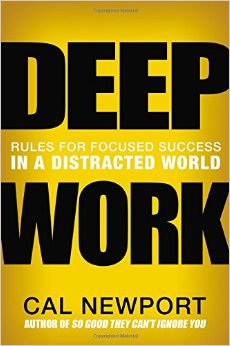How Cal Newport’s 'Deep Work' Principles Can Fundamentally Improve Diversity In The Legal Profession
People play differently when they’re keeping score; if we want to compete on a level playing field, then we need to keep score.
 “Numbers is hard and real and they never have feelings / But you push too hard, even numbers got limits / Why did one straw break the camel’s back? / Here’s the secret / The million other straws underneath it / It’s all mathematics.” – Yasiin Bey f/k/a Mos Def
“Numbers is hard and real and they never have feelings / But you push too hard, even numbers got limits / Why did one straw break the camel’s back? / Here’s the secret / The million other straws underneath it / It’s all mathematics.” – Yasiin Bey f/k/a Mos Def
This month, Cal Newport published his newest book, Deep Work: Rules for Focused Success in a Distracted World. As a huge fan of his previous book So Good They Can’t Ignore You, I couldn’t wait to read his latest work. And it did not disappoint. In fact, I recently had a chance to review several of its core principles on Bentley Tolk’s Legal Marketing Launch Podcast. On Tuesday, Business Insider highlighted the benefits and efficiency of incorporating Newport’s “deep work” philosophy.
It is no secret, we live in an increasingly 24/7 connected world. More and more research has revealed how constant connectivity is actually hurting our productivity. In Deep Work, Newport presents a rigorous training regimen, presented as a series of four “rules,” for transforming one’s mind and habits to support “deep work.”

How The New Lexis+ AI App Empowers Lawyers On The Go
He defines “deep work” as “professional activities performed in a state of distraction-free concentration that push your cognitive capabilities to their limit. These efforts create new value, improve your skill, and are hard to replicate.” Alternatively, he defines “shallow work” as “noncognitively demanding, logistical-style tasks, often performed while distracted. These efforts tend to not create much new value in the world and are easy to replicate.”
In this digital day and age, Newport contends that “deep work” is becoming more valued and thus more rewarded. I believe this ever-increasing premium for “deep work” is the primary driver for increased billable-hour rates. Supply and demand is perhaps one of the most fundamental concepts of economics. It’s simple, right?
To commit to “deep work,” Newport advocates for most serious professionals to quit social media. He quotes the respected New Yorker staff writer George Packer as stating, “Twitter is crack for media addicts. It scares me, not because I’m morally superior to it, but because I don’t think I could handle it.” Some may regard quitting social media as extreme, but others believe we need extreme solutions to deal with the extreme times in which we live.
To support his “deep work” philosophy, Newport references Chris McChesney’s book, The 4 Disciplines of Execution, which built on extensive consulting case studies to describe four “disciplines” (abbreviated, 4DX) for helping companies successfully implement high-level strategies. Of these four “disciplines” of execution, the third discipline – keep a compelling scoreboard – if followed, could cause the biggest ripple in the waterfront on diversity in the legal profession.
Sponsored

Law Firm Business Development Is More Than Relationship Building

AI Presents Both Opportunities And Risks For Lawyers. Are You Prepared?

Happy Lawyers, Better Results The Key To Thriving In Tough Times

AI Presents Both Opportunities And Risks For Lawyers. Are You Prepared?
I believe the best law firms, lawyers, and law students already practice the other three “disciplines” – focus on the wildly important, act on the lead measures (behaviors that will drive success), and create a cadence of accountability – in all other aspects of their professional work. Why not apply these “disciplines” of execution to a diverse and inclusive work environment? As noted by Newport, the 4DX authors write:
‘People play differently when they’re keeping score…’
[W]hen attempting to drive your team’s engagement toward your organization’s wildly important goal, it’s important that they have a public place to record and track their lead measures. This scoreboard creates a sense of competition that drives them to focus on these measures, even when other demands vie for their attention. It also provides a reinforcing source of motivation. Once the team notices their success with a lead measure, they become invested in perpetuating this performance.

When it comes to diversity, we need to keep score.
Maybe quitting social media entirely isn’t prudent for a law firm, lawyer, or law student. But are you at least conscious of the opportunity cost of social media’s addictive nature? As Newport writes, “if you don’t attempt to weigh pros against cons, but instead use any glimpse of some potential benefit as justification for unrestrained use of a [social media] tool, then you’re unwittingly crippling your ability to succeed in the world of knowledge work.”
No doubt, keeping a compelling scoreboard when it comes to proactive diversity and inclusion activities will require discipline. But are you aware of the impact of not tracking these types of activities? The lack of measurements and accountability will always lead to the status quo.
Sponsored

Curbing Client And Talent Loss With Productivity Tech

How The New Lexis+ AI App Empowers Lawyers On The Go
As I discussed with Bentley Tolk this week, the pain of discipline is never as great as the pain of regret. Organizations like the New York City Bar are proactively tracking key metrics so we can begin to truly understand the problem. Although diversity and inclusion have a long way to go in markets like New York City, the NYC Bar is consciously focusing on the impact of bias on lawyers and other lead measures so it can improve its lag measures – its results.
People play differently when they’re keeping score. If we want to compete on a level playing field, then we need to keep score. It’s pretty simple. This doesn’t mean it will be easy, but how else do we expect to make any progress?
Deep Work: Rules for Focused Success in a Distracted World [Amazon (affliate link)]
So Good They Can’t Ignore You: Why Skills Trump Passion in the Quest for Work You Love [Amazon (affiliate link)]
The 4 Disciplines of Execution: Achieving Your Wildly Important Goals [Amazon (affiliate link)]
Renwei Chung attends SMU Dedman School of Law. He has an undergraduate degree from Michigan State University and a MBA from the University of Chicago. He is passionate about writing, technology, psychology, and economics. You can contact Renwei by email at [email protected], follow him on Twitter (@renweichung), or connect with him on LinkedIn.







